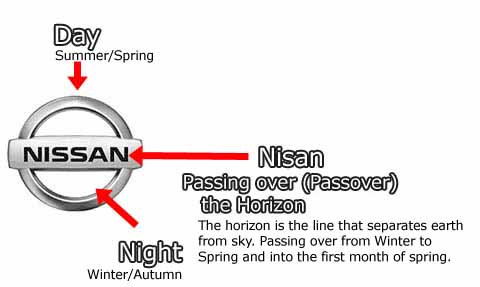|
|
Nisan/Nissan
Nisan
Nisan (Standard Hebrew Nisan, Tiberian Hebrew Nīsan: from Akkadian nisanu, from Sumerian nisag "First fruits") is the first month of the civil year and the seventh month (eighth, in leap year) of the ecclesiastical year on the Hebrew calendar. The name of the month is Babylonian; in the Torah it is called Aviv, meaning spring. It is a spring month of 30 days.
It is also the Turkish & Arabic name for the month of April.
In traditional Christian belief Jesus' death occurred at 3:00 (i.e., the ninth canonical hour) on the afternoon of 15 Nisan, the first day of Passover, and the Last Supper was a Passover Seder held the night before on the evening of 15 Nisan. In the Hebrew calendar the day begins at sunset, as in the Book of Genesis, "there was evening, and there was morning" in that order.
Article from: http://en.wikipedia.org/wiki/Nisan

Passover
Passover, also known as Pesach or Pesah (pesa), is a Jewish holiday, beginning on the evening of the 14th day of Nisan, that commemorates the Exodus and freedom of the Israelites from Ancient Egypt.
Origins of the feast
The term Passover comes from the Hebrew Bible, first mentioned in the Book of Exodus. It came into the English language through William Tyndale's translation of the Bible, and later appeared in the King James Version as well. As God pronounced to the people of Israel enslaved in Egypt that he would free them, he said he would "Smite all the firstborn in the land of Egypt." However, he instructed the Israelites to put a sign of lamb's blood on their door posts: "and when I see the blood, I will pass over you." (Exodus 12:13, King James Version) The original verb in the Hebrew Torah is posach. The noun form, pesach, also appears in that same chapter, in reference to that lamb, which was sacrificed earlier that day and then eaten on that night: "and ye shall eat it in haste: it is the Lord's passover." (Exodus 12:11)
Although the term itself is not mentioned until the Book of Exodus, there are indications that at least parts of the feast were observed in earlier times. For example, in Genesis 19:3 reference is made to "unleavened bread" without any reason given for it. The scholar Maimonides leaves a short commentary on the end of the verse ("It was Passover"), indicating that it wasn't necessarily a standard practice to prepare and eat unleavened bread, but that Lot was in a rush to serve the angels, and therefore did not have time to prepare proper, leavened bread.
The three main applicable groups of commandments associated with the holiday are: eating matzoh, or unleavened bread; the prohibition of eating any foods containing leavening during the holiday1); and the retelling of the Jews' miraculous exodus from ancient Egypt (Mitzrayim). In ancient times (until today among the Samaritans) there was a fourth: the offering of a lamb in the evening on the 14th of the Hebrew month of Nisan (also known as Aviv) and the eating that night of the Passover sacrifice. The commandment of retelling the Exodus is fulfilled through a communal ritual called the seder, celebrated on the first two evenings of the holiday (in Israel, only on the first evening). Other customs associated with Passover include eating bitter herbs and other foods specified for the seder meal. While many reasons are given for eating matzoh, the book of Exodus explains that it recalls the bread the Israelites ate at the time of the Exodus: in their rush to leave Egypt, they did not have time for the bread to rise.
Article from: http://en.wikipedia.org/wiki/Passover
Abib
Abib, also spelled Aviv, has three meanings in Hebrew:
The stage in the growth of grain when the seeds have reached full size and are filling with starch, but have not dried yet. During the plague of hail (Exodus 9:31), the barley was abib and the flax was giv`ol.
The month in the Hebrew calendar when the barley has reached or passed this stage (Ex. 13:4; 23:15); the first of the Jewish ecclesiastical year, and the seventh of the civil year. It began about the time of the vernal equinox, on 21st March. It was called Nisan, after the Babylonian captivity (Neh. 2:1). On the fifteenth day of the month, harvest was begun by gathering a sheaf of barley, which was offered to the Lord on the sixteenth (Lev. 23:4-11).
The season when barley ripens; spring. Thus the major modern Israeli city of Tel Aviv means "Springhill".
Article from: http://en.wikipedia.org/wiki/Aviv
Related: A Survey of Automotive Heraldry
Mazda (Ahura Mazda)
|
|
|
|
. |
|